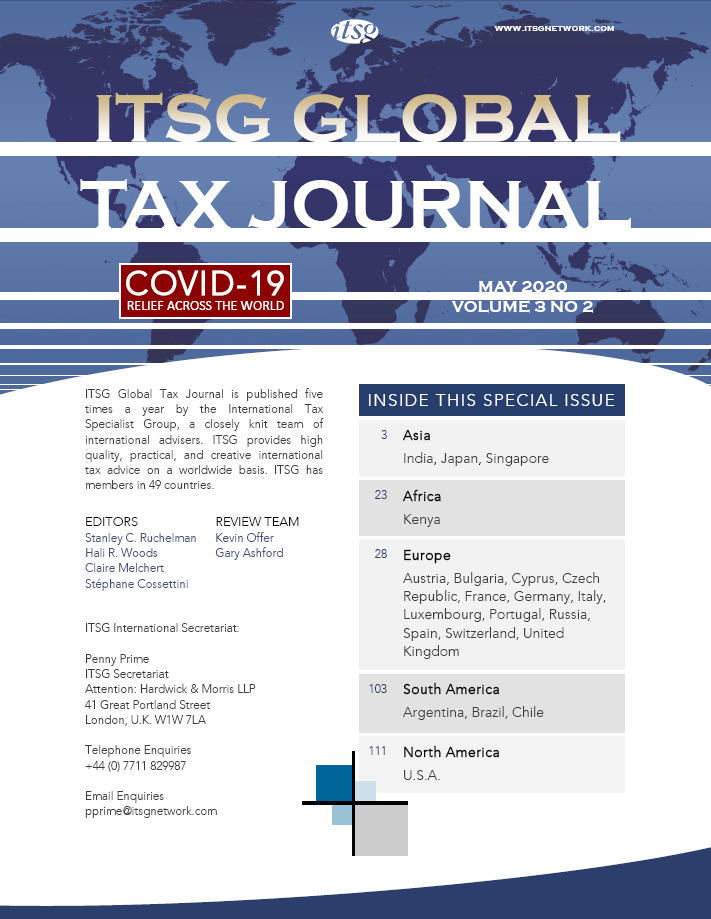Given these uncertain times during the COVID-19 pandemic across the globe, we can understand that the entire business community is anxious with this pending uncertainty.
As the pandemic causes havoc to global financial markets and balance sheets alike, even the Indian Government has introduced a slew of measures to try and contain the irreversible damage. The Government’s measures include easing of company secretarial and tax related compliances as well as benefits in the form of disbursements of cash and food grains to the marginalized. The Indian central bank – Reserve Bank of India (“R.B.I.”) also stepped in with monetary policy announcements, including a reduction in the repo rate as well as a three-month moratorium on term loan payments, aimed at battling the impact of economic slowdown.
Businesses too are looking at solutions to either delay or terminate obligations that may have cash flow implications. We trust this update will provide a clearer perspective of the general economy and policies in place from an Indian perspective. This article will address matters other than tax.
CONTRACTS
Force Majeure
- Such clauses generally suspend or terminate a contract if a breach in performance occurs, due to events “outside the control” of the relevant contracting party.
- Indian Courts, following common law principles, have set out the following key rules for triggering a Force Majeure (F.M.) clause:
- Clause needs to be strictly interpreted.
- Mere inconvenience or adverse financial implications is not sufficient.
- Serious hindrance to performance is required.
- Strict compliance on notice and other provisions is required.
- Words used on the clause are to be interpreted sui generis.
- Following the lead of the Chinese government, the Indian government has declared a blanket F.M. with respect to public procurement contracts. Such notification does not impact private contracts; however, we think subject to other criteria being met (please see above), this could be used to argue in favor of an F.M. even in private contracts.
- It is possible that continuance of F.M. may result in frustration of a contract. This is dealt with in greater detail below.
Doctrine of Frustration
- If a contract becomes impossible to perform due to the lock down/travel restrictions declared by various governments, the contract becomes void.
- The consequence of the same is that any party that received any benefit under the contract is bound to restore the benefit.
- As example of such a contract will be the supply of good or services at a particular place and time (time being essence) requiring transportation/travel of goods or people and the same is impossible due to the lock down.
- Indian courts have held the doctrine of frustration to apply when it is clear that the intervening circumstances are such that it goes to the very root of the contract.
- Due to the requirement of returning all benefits on the contract becoming void, parties generally will seek to renegotiate rather than declare the contract void.
Material Adverse Change (MAC)
- MAC clauses are standard in the M&A world.
- An adverse impact on cash flow or financial health of the company will generally be covered in a properly drafted MAC clause.
- Generally, one will find language that says that investment/contract is contingent upon no MAC occurring.
- Given that the pandemic is likely to permanently damage earning capacity and financial health of a number of businesses, a MAC clause can be relied on to not make the agreed investment.
INSURANCE
- We recommend a comprehensive review of all credit risk policies and its potential interface with declaration of force majeure event under a contract.
- Indian all risk policies generally do not cover business disruption. It is, however, worth looking at the policies to check on coverage.
- Remote working enhances cyber risk. Keeping your organization’s cyber insurance policy under review is advised.
- Under all circumstances, businesses must ensure proper notifications to the insurers to avoid any complications at the time of payment of claims.
REGULATORY INTERFACE & LITIGATION
- The Supreme Court extending limitation for filing claims will give relief to parties unable to commence proceedings due to the lock down.
- The government declared a two-quarter moratorium on late filing fee for all delayed filings on the website of Ministry of Corporate Affairs and several reliefs from potential company law violations.
- The threshold of default for corporate insolvency has been increased from INR 0.1 million to INR 10 million. Accordingly, even if the current situation will lead to a default, there has been some relief given to businesses, though in our view not sufficient.
- The government will also consider suspension of access to the Insolvency and Bankruptcy Code, 2016 for corporate insolvency, if the situation does not improve post 30 April 2020.
EMPLOYMENT
- The Union Government and several state governments have issued advisories asking employers to allow employees to work from home.
- In several cities, it will not be possible for commercial establishments (offices and shops/retail outlets) to keep all employees gainfully employed at all times.
- It will be necessary that the employers assess their exposure in relation to:
- Payment obligations to employees during the lockdown/shutdown
- Risks arising from confidentiality, data protection, data breach/integrity arising due to work from home directives
- Downsizing (retrenchment and/or lay-offs) or closure depending upon the extent of economic loss or prospect of recovery
- Review of disaster protocols to deal with pandemic like situations in future.
GLOBAL MOBILITY
Visas
- E-visa facilities currently suspended to several nationalities.
- Consular visa processing is also suspended across several Indian Consulates/Missions across the world, unless there is an urgent/emergency requirement for travel.
- Expatriates planning assignments/business visits to India have no option but to wait until the Indian Government announces further directives.
International Travel to and from India
- The Government of India recently announced an international travel restriction (passenger commercial aircrafts) in India from 22 March 2020 to 29 March 2020, whereby no international passenger commercial flights will be permitted to take off or land in India. This restriction has now been extended until 14 April 2020, for any incoming international flights. Expatriates that were planning to exit India will be unable to do so until this ban is lifted or otherwise notified by the Government.
Domestic Travel within India
- The Ministry of Civil Aviation, Government of India has also announced that the domestic schedule commercial airlines will also cease operations with effect from midnight on 24 March 2020 until 31 March 2020. Further directives on this will also be announced at the end of the month.
Expatriates currently in India
- For those expatriates that are currently in India on assignment and require to extend their visas, they will be permitted to do so via the online Government portal. As the Foreigner Regional Registration Offices (“F.R.R.O.”) are currently functioning at reduced capacity, it is highly recommended that all expatriates commence their renewal processes well in advance in order to avoid any untimely delays.
- Unless requested by the authorities and by prior appointment only, foreign nationals are restricted from visiting the F.R.R.O. until further notice.
We anticipate any further updates on travel restrictions to and from India will be announced towards the end of the month.
We anticipate that there may be frequent updates from the Government over the next few weeks and we shall be sharing these updates as they come in.
If at all there are other issues that you or your businesses are dealing with that have not been considered in our update, please feel free to reach out to us. We are available to support you and be your partner in navigating these unprecedented times to ensure you are protected to the fullest and are able to dedicate your attention to more pressing matters.
TAX
No discussion of relief measures would be complete without a brief reference to tax provisions.
Direct Tax
- Due date for filing income-tax return for the financial year 2018-19 (1 April 2018 to 31 March 2019) has been extended from 31 March 2020 to 30 June 2020.
- Deadline for paying taxes under the settlement scheme for income-tax disputes, without paying an additional 10% amount, has been extended from 31 March 2020 to 30 June 2020.
- Due dates for various actions under direct tax laws (income-tax, wealth-tax, income-tax dispute settlement law, etc.) which are expiring in the period 20 March 2020 to 29 June 2020 have been extended to 30 June 2020. This would include due dates for issue of notice, intimation, notification, approval order, sanction order, filing of appeal, furnishing of return, statements, applications, reports, any other documents and also time limit for completion of proceedings by the authority and any compliance by the taxpayer including investment in saving instruments or investments for roll over benefit of capital gains.
- Penal interest applicable on delayed payment of direct taxes (withholding taxes, advance taxes, self-assessment taxes, etc.) during the period 20 March 2020 to 30 June 2020 will be computed at 0.75% p.m. instead of 1% p.m. or 1.5% p.m., as otherwise applicable. Late fee and penalty shall not be charged for delay relating to this period.
- The above measures have been currently announced through a press release and will be suitably incorporated in the law through issue of legal circulars and legislative amendments in due course.
Indirect Tax
- Due date for filing GST annual return for the financial year 2018-19 has been extended from 31 March 2020 to 30 June 2020.
- Various tax returns under the Goods and Services Tax (GST) law falling due in the months of March, April and May 2020 would be permitted to be filed by 30 June 2020 without payment of late fees and penalty. In such cases, no interest would be charged for small dealers with aggregate annual turnover less than INR 50mn. For others, penal interest would be charged at 9% p.a. instead of the rate of 18% p.a. otherwise applicable under law.
- Deadline for making payment under settlement scheme for indirect-tax disputes has been extended till 30 June 2020 without charging any additional interest.
- Due dates for various actions under GST law which are expiring in the period 20 March 2020 to 29 June 2020 have been extended to 30 June 2020. This would include due dates for issue of notice, notification, approval order, sanction order, filing of appeal, furnishing of return, statements, applications, reports, any other documents.
The above measures have been currently announced through a press release and will be suitably incorporated in the law through issue of legal circulars and legislative amendments.
Stranded Visitors
India has been under a nation-wide lockdown since 22 March 2020 due to COVID-19 pandemic which has also resulted in cancellation of international flights. As the COVID-19 lockdown has extended over two financial years in India i.e. financial year 2019-20 (1 April 2019 to 31 March 2020) and financial year 2020-21 (1 April 2020 to 31 March 2021), questions have arisen on how the tax residency will be determined for individuals, who are as such non-residents, but are staying in India only due to these circumstances.
At the outset, it is important to note that an individual will be consid ered ‘resident’ in India under the Income-tax Act, 1961 (‘the Act’), if:
- The Individual is in India for an aggregate period of 182 days or more in the financial year; or
- The Individual is in India for an aggregate period of 60 days or more in the financial year and the total stay in India in the preceding 4 financial years was 365 days or more.
For non-Indian individuals visiting India, both the above conditions need to be tested to determine their tax residential status in India. However, Indian citizens or persons of Indian origin, who are based outside India and visit India, will be treated as ‘resident’ in India only if they are in India for an aggregate period of 182 days or more in the financial year.1
Due to the COVID-19 lockdown, there could be cases where individuals may become ‘resident’ in India during financial year 2019-20 and 2020-21 on account of their involuntary extended stay in India. To address hardships of genuine cases, on receipt of representations, the Indian authorities have issued a Circular2 on 8 May 2020. The Circular clarifies how the number of days of stay in India would be computed for the financial year 2019-20 in cases of Individuals who came to India on a visit before 22 March 2020. A summary of the same is as under:
| Situation | Circumstances | Period of stay in India to be excluded: |
| 1 | Unable to leave India on or before 31 March 2020 | 22 March 2020 to 31 March 2020 |
| 2 | Quarantined in India due to COVID-19 on or after 1 March 2020 and departed on an evacuation flight on or before 31 March 2020 | From date of beginning of quarantine to date of departure |
| 3 | Quarantined in India due to COVID-19 on or after 1 March 2020 but unable to leave India on or before 31 March 2020 | From date of beginning of quarantine to 31 March 2020 |
| 4 | Departed on an evacuation flight on or before 31 March 2020 | 22 March 2020 to date of departure |
Essentially, the Circular provides that based on the facts of the case, 1 to 31 days would be excluded (period between 1 March 2020 to 31 March 2020) while determining the tax residency of such individuals for financial year 2019-20.
Broadly speaking, the relief under this Circular would have to be considered as under:
| Sr .No. | Particulars | Relief |
| 1 | Non-Indian individual visiting India for work | Depending on facts, 1 to 31 days of stay in India would be excluded while considering the residential status threshold of:
|
| 2 | Non-Indian individual visiting India for leisure (Assuming that stay in India for the financial years 2015-16 to 2018-19 would be less than 365 days) | Depending on facts, 1 to 31 days of stay in India would be excluded while computing the residential status threshold of 182 days stay in India in financial 2019-20. |
| 3 | Indian citizens or persons of Indian origin visiting India for work or leisure | Depending on facts, 1 to 31 days of stay in India would be excluded while computing the residential status threshold of 182 days stay in India in financial 2019-20 |
The Circular does not deal with determination of the residential status for the financial year 2020-21 (1 April 2020 to 31 March 2021). In this context, by way of a press release of 9 May 2020, the Indian authorities have clarified that while a suitable Circular shall be issued after international flight operations normalise, the period of stay of these individuals up to the date of normalisation of international flight operations will be excluded.
On a separate note, as per the Act:
- A firm is resident in India if even a part of its management or control is exercised from India.
- A foreign company is resident in India if its ‘place of effective management’ is in India.
It would be desirable that the tax authorities also clarify on the tax residency of such foreign entities in India if a part of their management or control has been exercised from India on account of the extended involuntary stay of its concerned decision maker, owner, etc. in India due to the lockdown.
1 From 1 April 2020 onwards, separate residency conditions are provided for certain Indian citizens and Indian-origin individuals. Our notes on the impact of the updated residency provisions were circulated earlier.
2 Circular No. 11 of 2020 dated 8 May 2020 issued by the Central Board of Direct Taxes (CBDT)

 Login
Login





















































